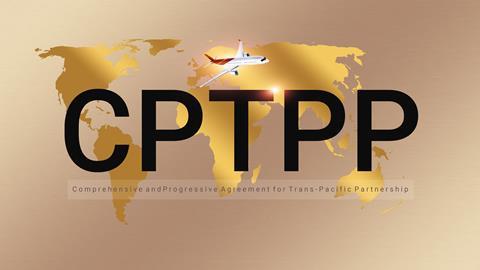Industry reaction to newest post-Brexit trade deal is largely positive
Farmers’ groups have reacted warmly to the government’s announcement that it has concluded a deal to join the Comprehensive and Progressive Agreement for Trans-Pacific Partnership (CPTPP).
CPTPP is a large free-trade area of 11 countries spanning the Indo-Pacific, and Prime Minister Rishi Sunak announced on Friday 31 March that the UK is set to join.
The government said the deal ”puts the UK at the heart of a dynamic group of economies, as the first European member and first new member since CPTPP was created”. The bloc is home to more than 500 million people and will be worth 15 per cent of global GDP once the UK joins.
The government estimates that joining will boost the UK economy by £1.8bn in the long run, and said every nation and region of the UK is expected to benefit. More than 99 per cent of UK goods exports to CPTPP countries will now be eligible for zero tariffs.
Total UK exports to CPTPP countries were already worth £60.5bn in the 12 months to the end of September 2022 and are set to grow under CPTPP.
”We are at our heart an open and free-trading nation, and this deal demonstrates the real economic benefits of our post-Brexit freedoms,” Sunak said. “As part of CPTPP, the UK is now in a prime position in the global economy to seize opportunities for new jobs, growth and innovation.”
He stressed that the agreement ”protects the UK’s vital industries and entities, including agriculture and the National Health Service, and upholds our high animal welfare and food safety standards.”
Positive reaction from farmers
NFU president Minette Batters said joining the CPTPP could provide opportunities to get more British food on plates overseas. The union has an ambition to grow British food exports by 30 per cent by the end of the decade.
“Compared to the deals struck with Australia and New Zealand, I am pleased to see that the Prime Minister has stuck to his word and the government has negotiated a far more considered and balanced outcome, particularly with respect to managing market access in our most vulnerable sectors,” Batters said.
”I will continue to press government to ensure its domestic policies are aimed at improving the competitiveness of British farming and strengthening our domestic food security.
“I am pleased that our government continues to maintain its commitment to our food safety standards. It is an absolute red line for us that food produced using practices that are illegal here – for instance, the use of hormones in beef and pork production and chemical washes for carcases – should not be allowed on our market.”
Mark Tufnell, president of the Country Land & Business Association (CLA), said the deal appeared to be a “bold and ambitious step forward for the UK’s trade policy”.
He added: ”The UK produces world-class food and drink to some of the highest environmental and animal welfare standards found anywhere in the world. These countries will want to buy British produce, and they will now find it easier to do so. As always with such negotiations, the question is what the UK has to give away to secure such opportunities.”




